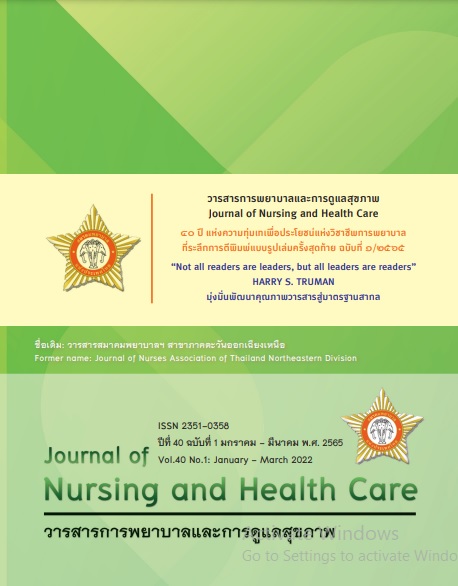ผลลัพธ์ของการพัฒนาพฤติกรรมสุขภาพของบุคลากรที่มีภาวะอ้วนลงพุง โรงพยาบาลค่ายประจักษ์ศิลปาคม จังหวัดอุดรธานี: การวิจัยเชิงผสมผสาน
คำสำคัญ:
ภาวะอ้วนลงพุง, การพัฒนาพฤติกรรมสุขภาพ, บุคลากรด้านสุขภาพบทคัดย่อ
การวิจัยเชิงผสมผสาน(Mixed- Methodology)แบบแผนอธิบาย( Explanatory design ) เพื่อศึกษาผลลัพธ์และปัจจัยความสำเร็จ ความล้มเหลวของการพัฒนาพฤติกรรมสุขภาพของบุคลากรที่มีภาวะอ้วนลงพุง โรงพยาบาลค่ายประจักษ์ศิลปาคม จังหวัดอุดรธานี ผู้ให้ข้อมูลเป็นผู้จัดกิจกรรมโครงการ 6 คนและบุคลากรที่มีภาวะอ้วนลงพุง 47 คน เก็บรวบรวมข้อมูลโดยใช้แบบสัมภาษณ์เชิงลึก แนวคำถามการสนทนากลุ่ม การชั่งน้ำหนัก วัดรอบเอวและแบบสังเกตแบบไม่มีส่วนร่วม เครื่องมือผ่านการตรวจสอบคุณภาพด้านความตรงเชิงเนื้อหาจากผู้เชี่ยวชาญ วิเคราะห์ข้อมูลเชิงปริมาณใช้สถิติเชิงพรรณนา paired t-test และ Wilcoxon signed-rank test และข้อมูลเชิงคุณภาพใช้การวิเคราะห์เนื้อหา
ผลการวิจัย บุคลากรที่มีภาวะอ้วนลงพุงร้อยละ 8.51 ลดน้ำหนักได้ตามเป้าหมาย(น้ำหนักลดลง ≥6 กิโลกรัมภายใน 6 เดือน) มีค่าเฉลี่ยของน้ำหนักลดลงจากเดิม 8.41 กิโลกรัมและค่าเฉลี่ยของรอบเอวลดลงจากเดิม 10.75เซนติเมตร ร้อยละ 91.49 ไม่สามารถลดน้ำหนักตามเป้าหมาย มีค่าเฉลี่ยของน้ำหนักเพิ่มขึ้นจากเดิม 0.40 กิโลกรัมแต่มีค่าเฉลี่ยของรอบเอวลดลงจากเดิม 2.43 เซนติเมตร เปรียบเทียบก่อนและหลังการพัฒนา กลุ่มที่ลดน้ำหนักได้ตามเป้าหมายมีน้ำหนักและรอบเอวลดลงแต่ไม่แตกต่างกันอย่างมีนัยสำคัญทางสถิติที่ระดับ.05 ส่วนกลุ่มที่ไม่สามารถลดน้ำหนักได้ตามเป้าหมายมีรอบเอวลดลงอย่างมีนัยสำคัญทางสถิติที่ระดับ.05 ปัจจัยแห่งความสำเร็จของการพัฒนาพฤติกรรมสุขภาพโดยการลดน้ำหนักและรอบเอว มาจากหน่วยงานมีนโยบายชัดเจนมีรางวัลเป็นแรงจูงใจ บุคลากรมีความตั้งใจ มีวินัย ตั้งเป้าหมายชัดเจนและปฏิบัติตามหลักการ 3 อ. ของกรมอนามัยอย่างสม่ำเสมอ ผู้บังคับหน่วยและผู้ร่วมงานให้กำลังใจ กระตุ้นเตือนและชื่นชมความสำเร็จ มีสิ่งแวดล้อมที่เอื้อต่อการออกกำลังกาย มีการจำหน่ายอาหารพลังงานต่ำ มีสื่อสังคมกระตุ้นและมีการติดตามประเมินผลอย่างต่อเนื่อง ส่วนปัจจัยแห่งความล้มเหลวมีทั้งด้านบุคคลและสังคมสิ่งแวดล้อม จากผลการวิจัยหน่วยงานควรสนับสนุนการพัฒนาพฤติกรรมสุขภาพของบุคลากรเพื่อลดอ้วนลดพุงและติดตามประเมินผลอย่างต่อเนื่อง
Downloads
เอกสารอ้างอิง
Saklayen MG. The global epidemic of metabolic syndrome [internet]. 2018 [cited 2021 Oct 12]. Available from: https://www.ncbi.nlm.nih.gov/pmc/ articles/PMC5866840/
Prasertjit P, Limpaseni W, Sumanasrethakul C. Lifestyle factors associated with obesity in urban workers: A case study of faculty of medicine personnel, Vajira Hospital. Vajira Med. J. 2020; 64(1): 71-84.
Department of disease control. Know your number know your risk. [internet].2020 [cited 2021 Oct 12]. Available from: https://ddc.moph.go.th/uploads/ publish/1064820201022081932.pdf
Khamchata L, Dumrongpakapakorn P, Theeranut A. Metabolic syndrome: Dangerous signs required management. Srinagarind Med. J. 2018; 33(4): 386-95.
Methakanjanasak P, Sota C. Perception of difficulty managing metabolic syndrome from insider view. Journal of Nursing and Health Care. 2015; 33(4): 121-30.
Chayarin P, Sattham A. Factor associated with the metabolic syndrome in Chamab Sub-district, Wang Noi District, Ayutthaya Province. Association of private higher education institution of Thailand journal. 2016; 5(2): 33-47.
Boontein P, Anuritprasert B, Saneha C. Factors related to metabolic syndrome among Patients at Out-Patient Department. J N Sci. 2017; 35(4): 74-86.
Prasittipatt T, Rudtanasudjatum K, Methaphat C, Thetkathuek A. Factors influencing the abdominal obesity of employees in large-sized manufactories in the Eastern Region. Journal of Health Science. 2018; 27(5): 792-9.
Department of Health. [internet].2019 [cited 2021 Oct 12]. Available from: https://multimedia.anamai. moph.go.th/help-knowledgs/fat/
Wongsri P, Chintapanyakun T. Utilization of Orem’s theory with caring and advice for patients with heart failure. JOPN. 2019; 10(1): 209-19.
Bandura A. National Inst of Mental Health. Social foundations of thought and action: A social cognitive theory. [internet].2019 [cited 2021 Oct 12]. Available from: https://psycnet.apa.org/record/1985-98423-000
Sawetprasart P. Effects of self-regulation program on weight loss behavior and body weight among overweight female village health volunteer. J Prapokklao Hosp Clin Med Educat Center. 2019; 36(1): 47-56.
Opanasopit T, Natprayut N, Nongnart J, Ounpong K. Effects of self-regulation programs with a peer support group program through LINE application for weight control of healthcare providers. Thai Bull Pharm Sci. 2021; 16(1): 109-21.
Pansiri U, Ketmai W, Thevaaksorn P. Development of health promotion behaviors program to control body weight of public health officers in Bureau of Health Promotion, Department of Health, Ministry of Public Health. [internet].2019 [cited2022 March 14]. Available from: https://hp.anamai.moph.go.th/web-upload/4xceb3b571ddb70741ad132d75876b c41d/202106/m_
Pleangratong P, Tontham N, Vongprapan V. The self- motivation building procedure to control obesity of village health volunteers in Nonghuarat sub-district, Nongboonmak district, Nakhorn ratchasima Province. Journal of Nakhonratchasima College. 2018; 12(2): 59-70.
ดาวน์โหลด
เผยแพร่แล้ว
รูปแบบการอ้างอิง
ฉบับ
ประเภทบทความ
สัญญาอนุญาต
ลิขสิทธิ์ (c) 2022 วารสารการพยาบาลและการดูแลสุขภาพ

อนุญาตภายใต้เงื่อนไข Creative Commons Attribution-NonCommercial-NoDerivatives 4.0 International License.



